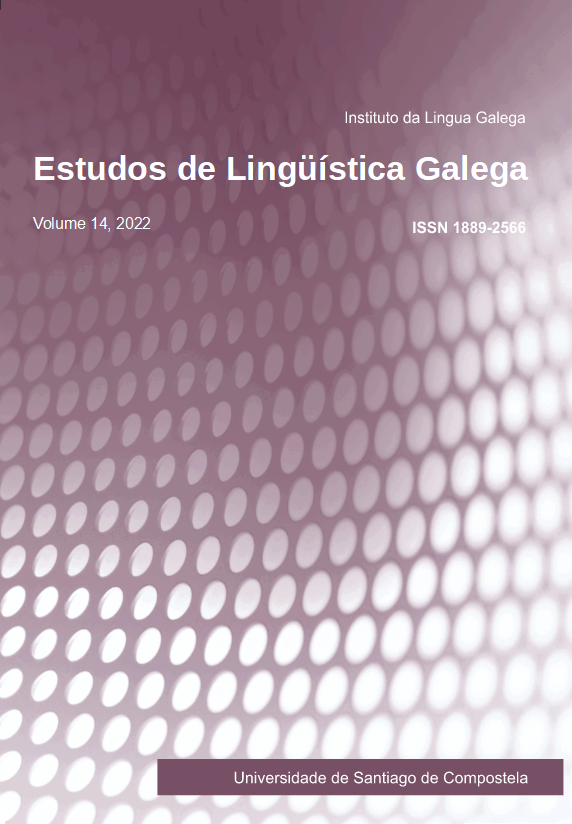The differentiation of Brazilian Portuguese and languages in contact
Main Article Content
Abstract
Keywords:
Article Details
References
Elia, Sílvio (1979): A unidade lingüística do Brasil. Rio de Janeiro: Padrão.
Graciosa, Diva (1991): Concordância verbal na fala culta carioca. Dissertação de Mestrado. Rio de Janeiro: Universidade Federal do Rio de Janeiro.
Guy, Gregory (1981): Linguistic variation in Brazilian Portuguese: aspects of phonology, sintax and language history. Tese de Doutorado. Pennsylvania: University of Pennsylvania.
Guy, Gregory (1989): “On the nature and origins of vernacula Brazilian Portuguese”. Estudios sobre Español de América y Linguística Afroamericana. Bogotá: Instituto Caro y Cuervo, 226-244.
Kato, Mary (1993): “Apresentação: “como, o que e por que escavar?””, em Mary / Ian Roberts (orgs.), Português brasileiro: uma viagem diacrónica. Campinas: Editora da Unicamp, 1993. p. 13-30.
Labov, William (1972): Sociolinguistics patterns. Oxford: Basil Blackwell.
Labov, William (1981): “What can be learned about change in progress from synchrony descriptions”, em David Sankoff / Henrietta Cedergren (eds.), Variation Omnibus. Carbondale: Linguistic Research, 177-199.
Lucchesi, Dante (2001a): “As duas grandes vertentes da história sociolingüística do Brasil”, DELTA 17(1), 97-130.
Lucchesi, Dante (2001b): “O tempo aparente e as variáveis sociais”, Boletim da ABRALIN 26, 135-137.
Lucchesi, Dante (2002): “Norma lingüística e realidade social”, em Marcos Bagno (org.), Lingüística da norma. São Paulo: Loyola, 63-92.
Lucchesi, Dante (2006): “Parâmetros sociolingüísticos do português brasileiro”, Revista da ABRALIN 5(1), 83-112.
Lucchesi, Dante (2009): “A concordância de gênero”, em Dante Lucchesi / Alan Baxter / Ilza Ribeiro (orgs.), O Português Afro-Brasileiro. Salvador: Edufba, 295-318.
Lucchesi, Dante / Baxter, Alan / Silva, Jorge (2009): “A concordância verbal”, em Dante Lucchesi / Alan Baxter / Ilza Ribeiro (orgs.), O Português Afro- -Brasileiro. Salvador: Edufba, 331-372.
Lucchesi, Dante; Mello, Camila (2009): “A alternância dativa”, em Dante Lucchesi / Alan Baxter / Ilza Ribeiro (orgs.), O Português Afro-Brasileiro. Salvador: Edufba, 427-456.
Mattos e Silva, Rosa Virgínia (2004): Ensaios para uma sócio-história do português brasileiro. São Paulo: Parábola.
Mattoso, Katia (2003): Ser escravo no Brasil. 3.ed. São Paulo: Brasiliense.
Naro, Anthony / Scherre, Marta (1993): “Sobre as origens do português popular do Brasil”, DELTA 9, 437-454.
Naro, Anthony / Scherre, Marta (2007): Origens do português brasileiro. São Paulo: Parábola.
Nina, Terezinha (1980): Concordância nominal/verbal do analfabeto na Micro-Região Bragantina. Dissertação de Mestrado. Porto Alegre: Pontifícia Universidade Católica do Rio Grande do Sul.
Pinto, Edite P. (1978): O português do Brasil: textos críticos e teóricos, 1 – 1820-1920, fontes para a teoria e a história. Rio de Janeiro / São Paulo: Livros Técnicos e Científicos / Editora da Universidade de São Paulo.
Ribeiro, Darcy (1997): O povo brasileiro: evolução e sentido do Brasil. 2 ed. 10 reimp. São Paulo: Companhia das Letras, 1997.
Risério, Antonio (2004): Uma história da Cidade da Bahia. Rio de Janeiro: Versal.
Scherre, Marta / Naro, Anthony. A concordância de número no português do Brasil: um caso típico de variação inerente, em Dermeval da HORA (org.), Diversidade linguística no Brasil. João Pessoa: Idéia, 93-114.
Silva, Jorge Augusto Alves da (2003): A concordância verbal no português afro-brasileiro: um estudo sociolingüístico de três comunidades rurais do Estado da Bahia. Dissertação de Mestrado. Salvador: Universidade Federal da Bahia.
Silva Neto, Serafim da (1963[1951]): Introdução ao estudo da língua portuguesa no Brasil. 2 ed. Rio de Janeiro: INL.


